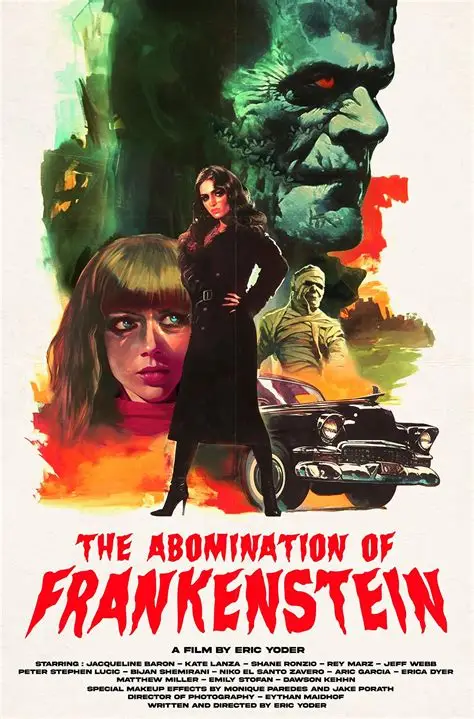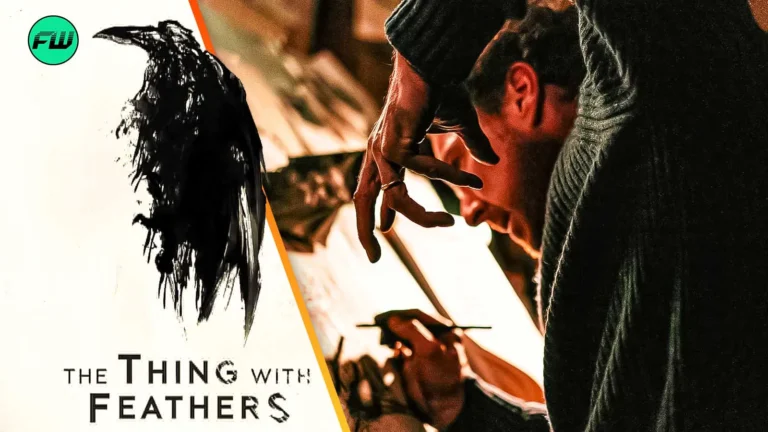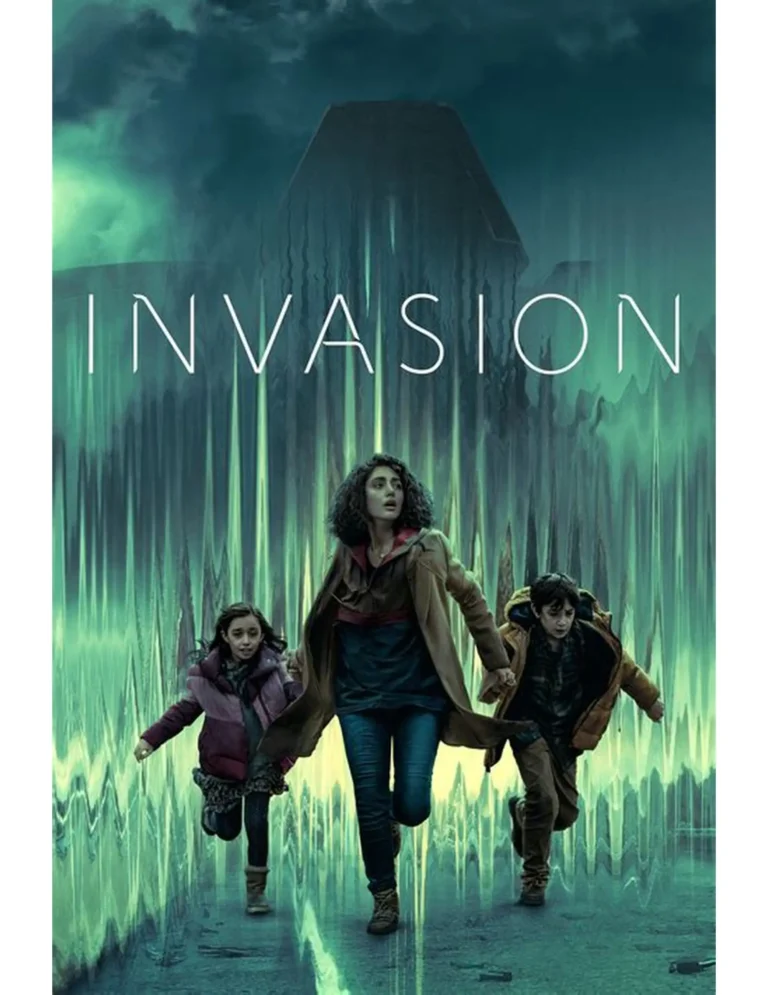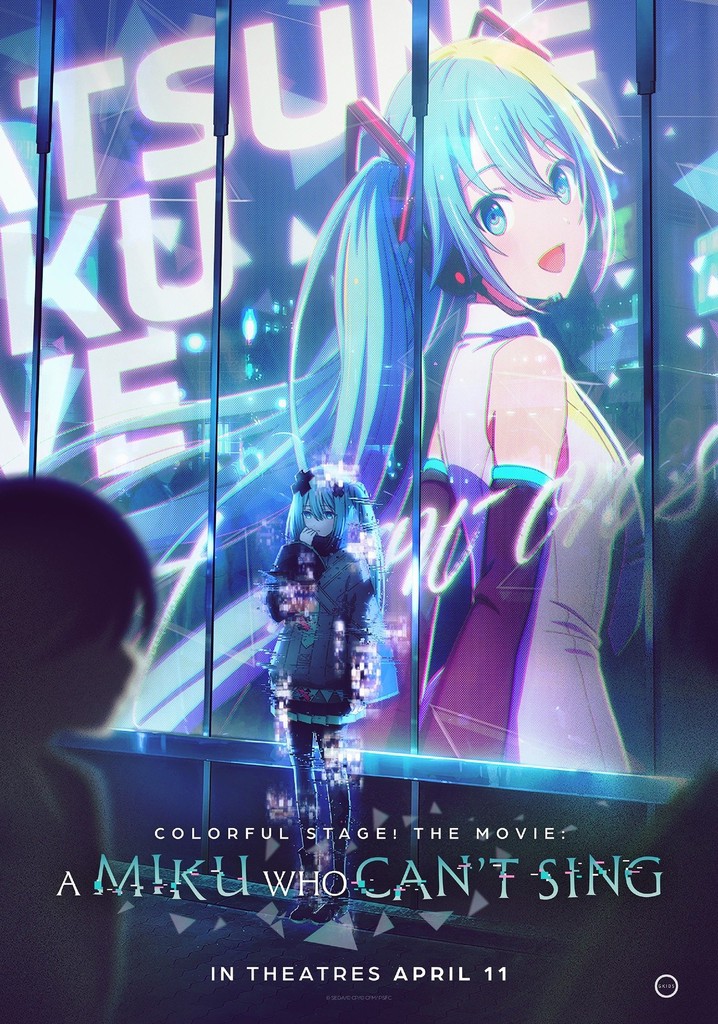
Colorful Stage! The Movie: A Miku Who Can't Sing (2025)
Colorful Stage! The Movie: A Miku Who Can’t Sing (2025) is one of the most anticipated anime films of the year, blending musical drama, fantasy, and character-driven coming-of-age themes. Directed by Hiroyuki Hata and starring the returning voice cast from the mobile rhythm game (led by Ai Furihata and the ensemble cast of the game’s bands), this Japanese-language film premiered in Japan in January 2025 and opened internationally on a staggered theatrical schedule in spring 2025. :contentReference[oaicite:0]{index=0}
Movie Overview[]
Colorful Stage! The Movie: A Miku Who Can’t Sing adapts the popular mobile rhythm game Hatsune Miku: COLORFUL STAGE! (also known as Project SEKAI) into a full-length feature. The story centers on Ichika Hoshino, a teen musician living in Shibuya, who encounters a troubled version of the virtual singer Hatsune Miku. This Miku — originating from a bleak, fractured SEKAI (a virtual “world” shaped by people’s emotions) — struggles to connect with others through song. Ichika and members of the game’s multiple bands (Leo/need, Wonderlands x Showtime, More More Jump!, Vivid BAD SQUAD, and Nightcord at 25:00) each interact with this version of Miku, exploring themes of creativity, loneliness, and how music can heal emotional rifts. :contentReference[oaicite:1]{index=1}

The film weaves together multiple character threads from the game into an ensemble musical drama: each band brings a different musical style and emotional perspective, and the central arc — helping Miku find her voice — becomes a metaphor for the characters confronting their own doubts and reconnecting with purpose. The movie balances spectacular musical set pieces with quieter, character-forward moments, aiming to reward both longtime players and newcomers. :contentReference[oaicite:2]{index=2}
Attribute Details[]
| Title | Colorful Stage! The Movie: A Miku Who Can’t Sing |
|---|---|
| Genre | Anime, Musical, Drama, Fantasy |
| Language | Japanese (with international dubs/subtitles) |
| Release Date | Japan: January 17, 2025 (wide); United States (GKIDS): April 17–18, 2025 (limited/expanded). |
| Director | Hiroyuki Hata |
| Writer | Yoko Yonaiyama |
| Production | P.A. Works |
| Distributor | Shochiku (Japan); GKIDS (North America) |
| Runtime | Approximately 110 minutes (1h 50m) |
Key creative and release information above is confirmed by trade listings and major databases. :contentReference[oaicite:3]{index=3}
Plot & Setting
The film’s emotional core is the fractured SEKAI: virtual spaces that represent characters’ inner lives and aspirations. When a version of Hatsune Miku incapable of reaching hearts appears across screens, she becomes a mirror for the young protagonists’ own fears and creative blocks. Ichika’s chance meeting with Miku (triggered by a chance listening moment in Shibuya) sets off a chain of encounters across the various bands’ personal SEKAI pockets. Each group interprets Miku’s silence differently, and through ensemble musical sequences the characters help restore connection — and, in doing so, rediscover why they create music in the first place. :contentReference[oaicite:4]{index=4}
Cast & Characters
The movie reunites the core voice cast from the mobile game, with Ai Furihata among the principal performers. The five in-universe bands — Leo/need, Wonderlands x Showtime, More More Jump!, Vivid BAD SQUAD, and Nightcord at 25:00 — all receive meaningful screen time, which is both a strength and (for newcomers) a lot to track. Virtual Singer Hatsune Miku is central to the plot, portrayed through voice performances and musical staging that blend vocaloid-produced songs with character-driven performances. :contentReference[oaicite:5]{index=5}
Filmmakers & Production
P.A. Works produced the film with Hiroyuki Hata directing and Yoko Yonaiyama on screenplay duties; character designs are handled by Yuki Akiyama and the score was composed by Satoshi Hōno. The production emphasizes high-quality animation for stage sequences and SEKAI transitions, with detailed crowd choreography and stylized lighting to sell the music-driven moments. Shochiku handled the theatrical release in Japan while GKIDS secured North American distribution — a partnership that helped the film reach hundreds of theaters during its limited run. :contentReference[oaicite:6]{index=6}
Visual & Musical Style
Visually, the movie alternates between grounded Shibuya cityscapes and vividly surreal SEKAI environments — each band’s SEKAI reflects its musical identity (neon punk for Vivid BAD SQUAD, theatrical whimsy for Wonderlands x Showtime, etc.). Musically, the film blends original game tracks and new compositions with iconic Vocaloid songs, producing a soundtrack that functions as both plot device and emotional commentary. Sound mixes include Dolby Atmos options in some presentations to enhance live-stage moments. :contentReference[oaicite:7]{index=7}
Release Strategy & International Rollout
After its January 2025 Japanese opening, Colorful Stage! The Movie rolled out in multiple international territories through licensed distributors. GKIDS released the film theatrically in North America in mid-April 2025, while select territories in Latin America and Asia saw releases from March through June 2025. Limited screenings, festival play, and fan-focused events (including postcard giveaways with in-game unlock codes at some theaters) accompanied the theatrical window to engage the game’s global community. :contentReference[oaicite:8]{index=8}
Box Office & Reception
The film performed strongly relative to its release scale: opening in a limited number of screens outside Japan, it nonetheless secured notable per-screen averages and early box office receipts. In Japan it grossed solidly in its opening weekend and passed significant milestones early in its run; U.S. limited engagement figures were healthy for a niche anime theatrical title. Critical reaction praised the film’s music and emotional beats while noting the crowded ensemble can be overwhelming for viewers unfamiliar with the game — a point reviewers recommended remedying by doing a little “homework” on the game’s world before a first viewing. :contentReference[oaicite:9]{index=9}
Who Should Watch
Fans of the mobile game and Vocaloid music are the film’s primary audience; however, families or music-lovers open to a densely populated ensemble musical will find emotional payoffs in the film’s final sequences. Newcomers can still appreciate the central Miku story — but those seeking a single-character arc should be prepared for a multi-threaded, mosaic-style narrative. :contentReference[oaicite:10]{index=10}
SEO Summary
Colorful Stage! The Movie: A Miku Who Can’t Sing (2025) — directed by Hiroyuki Hata and produced by P.A. Works — is an anime musical drama that adapts the globally popular Hatsune Miku: COLORFUL STAGE! game into a feature film. Released in Japan in January 2025 and distributed internationally by partners including GKIDS, the film combines varied band-centered SEKAI narratives with a central emotional quest to help a disconsolate Miku sing again. Its blend of musical spectacle, character drama, and Vocaloid culture makes it a standout 2025 anime release for fans of rhythm games and musical animation. :contentReference[oaicite:11]{index=11}
The Emotional Core of Colorful Stage! The Movie
One of the strongest aspects of Colorful Stage! The Movie: A Miku Who Can’t Sing (2025) is its emotional resonance. The story does not simply present Hatsune Miku as a perfect, flawless icon, but instead shows a version of her struggling to connect to people through music. This “silent” Miku becomes a mirror of human vulnerability, showing that even those who are symbols of creativity may falter. Through Ichika Hoshino and her friends’ determination to help her, the audience is reminded that music is not just about technical skill but about reaching into the hearts of others. This central message gives the film a relatable depth that goes beyond its vibrant visuals.
How the Movie Expands on the Game’s World
While the mobile game already explored the concept of SEKAIs—emotional worlds that manifest from characters’ feelings— Colorful Stage! The Movie takes this concept to a cinematic level. Each SEKAI is shown with far greater detail and artistry, giving audiences a unique opportunity to see how different characters express themselves through music. For example, Vivid BAD SQUAD’s SEKAI bursts with neon energy, while Wonderlands x Showtime offers a carnival-like dreamscape. By expanding these environments, the movie transforms the familiar rhythm game experience into a theatrical spectacle that immerses viewers in sound, color, and emotion.
The Role of Hatsune Miku in the Story
Hatsune Miku, one of the most recognizable virtual idols worldwide, takes on a surprisingly introspective role in this film. In Colorful Stage! The Movie: A Miku Who Can’t Sing, she is not the confident digital diva audiences know, but instead a fragile figure searching for her lost voice. This creative twist allows the story to explore Miku as more than an icon; she becomes a symbol of doubt, insecurity, and the struggle to rediscover purpose. This decision by the filmmakers has been widely praised as a bold narrative move that deepens her mythos and makes her more human than ever before.
The Animation Quality and Visual Storytelling
Produced by P.A. Works, the film features animation that rivals the studio’s best-known projects. The cityscapes of Shibuya are rendered with a striking balance of realism and stylization, while the SEKAI worlds shimmer with imaginative flair. Transitions between reality and fantasy are seamless, making it feel as though music itself bends the rules of space and time. The film’s choreography of stage performances is equally impressive, capturing the energy of live concerts while blending in the dreamlike surrealism of Vocaloid aesthetics. This visual storytelling ensures that every frame contributes to the film’s overall emotional journey.
The Soundtrack and Musical Experience
Music is at the heart of Colorful Stage! The Movie, and the soundtrack does not disappoint. Featuring a mix of iconic Vocaloid tracks, original songs, and remixes created exclusively for the movie, the score carries both narrative weight and entertainment value. Fans of the game will recognize familiar anthems, but the cinematic arrangements make them feel new again. Meanwhile, new compositions highlight the vulnerability of Miku’s arc, providing haunting melodies that reflect her silence and eventual rediscovery of song. The Dolby Atmos presentation in select theaters elevated these sequences, making audiences feel as though they were attending a live virtual concert.
Character Development Beyond the Stage
Unlike many rhythm game adaptations that focus solely on musical numbers, Colorful Stage! The Movie invests time in the personal stories of its ensemble cast. Characters such as Ichika, Saki, and the members of Nightcord at 25:00 confront their own insecurities, ranging from creative burnout to fear of failure. The narrative cleverly ties these struggles to Miku’s inability to sing, suggesting that finding one’s voice is a universal challenge. This character-driven approach adds layered storytelling, ensuring that the movie appeals not only to music fans but also to audiences who value emotional drama.
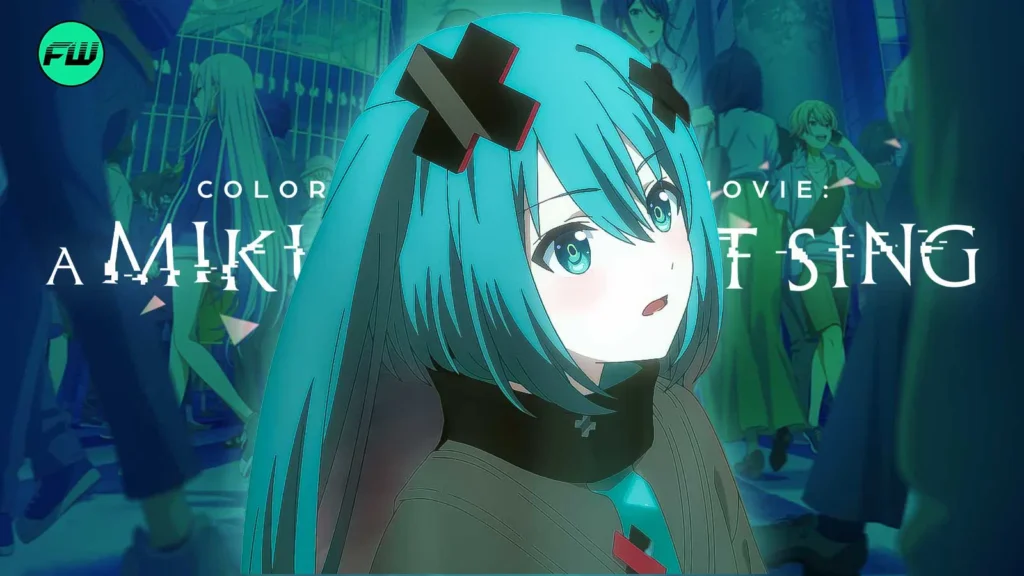
International Appeal of the Film
Although the movie is deeply rooted in Japanese culture and Vocaloid fandom, its themes have universal resonance. Colorful Stage! The Movie: A Miku Who Can’t Sing has been warmly received by international audiences, particularly in North America where GKIDS brought it to theaters. Fans across the globe have expressed how relatable Miku’s journey is, and the global success proves that music as a storytelling medium transcends cultural barriers. Subtitled and dubbed releases ensured accessibility, while limited fan events built excitement in overseas markets.
The Reception from Fans and Critics
Reviews for the movie have highlighted its ambitious scope and emotional depth. Critics praised its animation quality and musical integration, while some noted that newcomers to the franchise may find the ensemble cast overwhelming. Fans, however, have celebrated the movie as one of the best Vocaloid-related projects to date. Social media buzz has been particularly strong, with audiences sharing their favorite songs and emotional moments, proving that the film successfully connected with its core fanbase.
Why This Movie Stands Out in 2025
In a year filled with anime releases, Colorful Stage! The Movie: A Miku Who Can’t Sing stands out for its unique premise and heartfelt execution. Instead of focusing only on spectacle, the film dares to tell a story about doubt and the courage to rediscover one’s passion. This balance of introspection and grandeur has cemented its place as one of the most memorable anime films of 2025. For long-time fans of Hatsune Miku and the Project SEKAI universe, the movie feels like both a celebration and an evolution of what Vocaloid storytelling can achieve.
The Psychological Depth of Colorful Stage! The Movie
One of the reasons Colorful Stage! The Movie: A Miku Who Can’t Sing resonates so deeply is its psychological approach to character building. The film explores the inner conflicts of both humans and virtual idols, blurring the line between the digital and emotional. Miku’s inability to sing reflects real-world struggles with identity, performance anxiety, and self-doubt. By tackling these themes in a heartfelt way, the movie encourages audiences to look beyond the surface of music and consider what it means to find one’s authentic voice in a world of expectations.
The Impact of the Focus Keyword in Global Marketing
When it comes to global promotion, Colorful Stage! The Movie: A Miku Who Can’t Sing cleverly positions itself as more than just an anime adaptation. The keyword-rich title itself attracts attention, highlighting Miku’s vulnerability in contrast to her iconic status. This unusual branding strategy caught the attention of fans and critics worldwide, creating a sense of mystery. Marketing campaigns leaned into this theme, using trailers and posters that emphasized silence, broken microphones, and rediscovery. This unique approach ensured the film stood out among the crowded anime lineup of 2025.
The Role of Supporting Characters in Colorful Stage! The Movie
Although Hatsune Miku is the centerpiece, Colorful Stage! The Movie: A Miku Who Can’t Sing thrives because of its supporting cast. Groups such as Leo/need, Vivid BAD SQUAD, Wonderlands x Showtime, and Nightcord at 25:00 all play critical roles in shaping the emotional journey. Their interactions not only provide context to Miku’s struggles but also highlight the importance of friendship and collaboration in overcoming obstacles. Each group brings their own musical flavor, ensuring that the movie is a symphony of diverse personalities rather than a single-note performance.
The Balance Between Fantasy and Reality
A remarkable feature of Colorful Stage! The Movie: A Miku Who Can’t Sing is the balance it maintains between grounded human emotion and fantastical musical landscapes. On one hand, the characters deal with very real issues such as insecurity, loneliness, and creative burnout. On the other, the SEKAIs explode into surreal dreamscapes filled with color, rhythm, and symbolism. This duality mirrors the way people use art and music to escape while still processing real emotions. The result is a movie that feels both fantastical and relatable at the same time.
How Colorful Stage! The Movie Appeals to New Fans
One might assume that Colorful Stage! The Movie: A Miku Who Can’t Sing is only for fans of the mobile game, but the film is surprisingly accessible to newcomers. Its story about losing and rediscovering one’s voice is universal, and the visual spectacle ensures that even those unfamiliar with Project SEKAI can enjoy the experience. The movie introduces characters in a digestible way, making sure that first-time viewers can follow along while still rewarding longtime fans with deeper references and Easter eggs.
The Cultural Significance of Hatsune Miku
Hatsune Miku has long been a cultural phenomenon, and Colorful Stage! The Movie: A Miku Who Can’t Sing adds another layer to her legacy. Originally introduced as a Vocaloid voicebank, Miku has transcended her digital roots to become a global icon of creativity, collaboration, and fandom. This movie treats her not just as a character but as a cultural symbol, representing the struggles of artists everywhere. By showing Miku in a vulnerable state, the film emphasizes that even legends must sometimes fall silent before they can rise again.
The Influence of P.A. Works on the Film’s Style
The choice of P.A. Works to animate Colorful Stage! The Movie: A Miku Who Can’t Sing is crucial to its unique identity. Known for their ability to combine breathtaking visuals with emotional storytelling, the studio brought the world of Project SEKAI to life in a way that feels both dazzling and heartfelt. Their attention to lighting, textures, and environmental detail ensures that each scene resonates visually. Combined with innovative concert sequences, the animation pushes the boundaries of what an anime film about music can achieve.
The Global Fan Reactions to the Movie
Since its premiere, Colorful Stage! The Movie: A Miku Who Can’t Sing has inspired passionate responses from fans worldwide. Online communities have been filled with discussions about favorite songs, emotional scenes, and the symbolic meaning behind Miku’s silence. Many fans have praised the movie for making them reflect on their own creative struggles, proving the universal power of its message. Fan art, cover songs, and remixes inspired by the film have spread across social media, turning its release into a collaborative cultural event.
The Legacy of Colorful Stage! The Movie
Ultimately, Colorful Stage! The Movie: A Miku Who Can’t Sing is destined to be remembered as one of the defining anime films of 2025. Its combination of stunning animation, powerful music, and relatable storytelling ensures it will continue to influence fans and creators for years to come. Just as Hatsune Miku began as a tool for creativity and grew into a cultural icon, this film demonstrates how art evolves through collaboration between technology, creators, and audiences. Its legacy is not only cinematic but cultural, cementing its place in the history of Vocaloid and anime alike.
Why the Title Matters So Much
The decision to call the film Colorful Stage! The Movie: A Miku Who Can’t Sing was more than a marketing trick—it was a storytelling promise. By focusing on the paradox of a singer who has lost her voice, the title sets up expectations of vulnerability, growth, and transformation. It is precisely this unexpected angle that gives the film its emotional weight, drawing audiences in to discover how Miku will overcome her silence. In doing so, the title itself becomes a powerful piece of narrative foreshadowing.
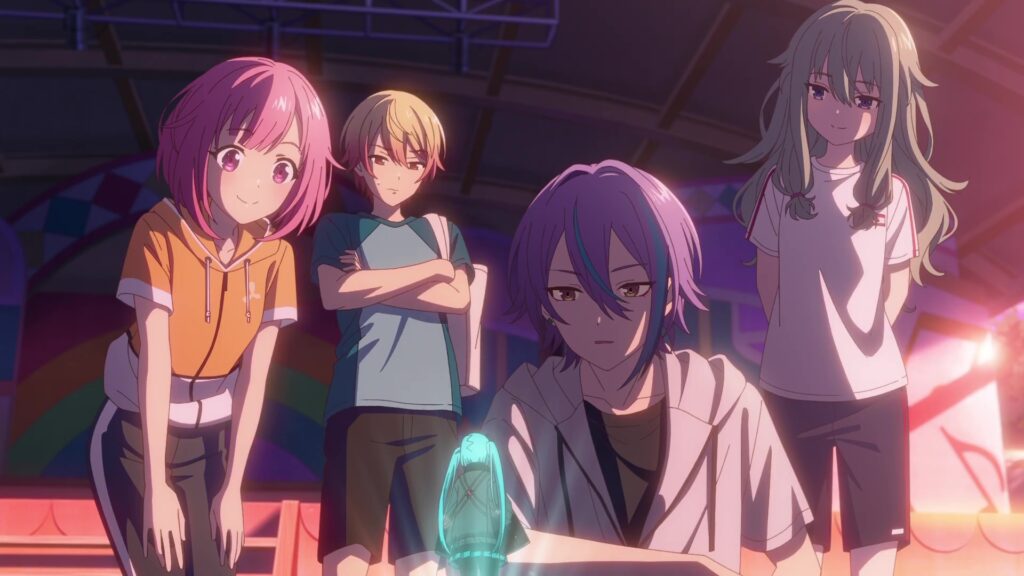
Frequently Asked Questions about Colorful Stage! The Movie
What is Colorful Stage! The Movie about?
Colorful Stage! The Movie is an anime film adaptation of the popular rhythm game Project SEKAI. The story focuses on Hatsune Miku, who loses her ability to sing, and follows her journey of self-discovery alongside other groups such as Leo/need, Vivid BAD SQUAD, and Nightcord at 25:00. It explores themes of identity, music, and emotional healing.
When is the release date for Colorful Stage! The Movie?
Colorful Stage! The Movie is scheduled for release in Japan in 2025, with international release dates expected to follow soon after. The exact timeline may vary depending on regional distribution.
Who is directing Colorful Stage! The Movie?
The director of Colorful Stage! The Movie is Shunsuke Tada, known for his work on popular anime series. His experience with emotionally rich storytelling ensures the film delivers both musical spectacle and heartfelt drama.
Is Colorful Stage! The Movie connected to the Project SEKAI game?
Yes, Colorful Stage! The Movie is directly inspired by the Project SEKAI: Colorful Stage! feat. Hatsune Miku mobile game. It expands on the characters and virtual worlds introduced in the game, making it a treat for both longtime fans and newcomers.
Which characters appear in Colorful Stage! The Movie?
Colorful Stage! The Movie features Hatsune Miku as the central character, along with other groups from the game such as Leo/need, Vivid BAD SQUAD, Wonderlands x Showtime, and Nightcord at 25:00. Each group contributes to the emotional and musical arc of the film.
What makes Colorful Stage! The Movie unique?
What sets Colorful Stage! The Movie apart is its focus on Hatsune Miku’s struggle with losing her voice, an unexpected storyline for an icon known for her music. This theme of silence and rediscovery adds a layer of depth rarely seen in anime music films.
Will Colorful Stage! The Movie include original songs?
Yes, Colorful Stage! The Movie will feature both original compositions and reimagined versions of beloved songs from the Project SEKAI game. These performances will be central to the film’s storytelling and emotional impact.
Can new fans enjoy Colorful Stage! The Movie without playing the game?
Absolutely! Colorful Stage! The Movie has been designed to be accessible for newcomers. While longtime fans will enjoy references and deeper lore, the main storyline is universal, focusing on music, identity, and emotional growth.
Which studio is animating Colorful Stage! The Movie?
Colorful Stage! The Movie is animated by P.A. Works, a studio renowned for visually stunning anime with strong emotional narratives. Their expertise ensures that the film’s musical and dramatic moments shine beautifully on screen.
Will Colorful Stage! The Movie have international screenings?
Yes, plans are already in motion to release Colorful Stage! The Movie worldwide. The film is expected to reach theaters and possibly streaming platforms, giving international fans a chance to experience the story alongside Japanese audiences.
How does Colorful Stage! The Movie portray Hatsune Miku?
In Colorful Stage! The Movie, Hatsune Miku is portrayed in a more vulnerable light than ever before. Instead of being the flawless virtual idol, she faces the challenge of losing her singing voice, making her journey deeply relatable and human.
Is Colorful Stage! The Movie only for anime fans?
No, Colorful Stage! The Movie is for anyone who appreciates music, emotional storytelling, or stunning animation. Even audiences unfamiliar with anime will find something powerful in its universal themes of resilience and creativity.
What is the runtime of Colorful Stage! The Movie?
The official runtime of Colorful Stage! The Movie has not yet been confirmed, but given its scope and production style, it is expected to be around 100 to 120 minutes, aligning with other major anime feature films.
Will Colorful Stage! The Movie have English subtitles or dubbing?
Yes, Colorful Stage! The Movie is expected to be released with English subtitles in international theaters. A dubbed version may also be produced, depending on the demand from overseas audiences.
Why should fans be excited about Colorful Stage! The Movie?
Fans should be excited because Colorful Stage! The Movie blends the best of music, animation, and heartfelt storytelling. It’s not just another adaptation—it’s a cinematic event that redefines Hatsune Miku’s legacy while exploring the universal struggle of finding one’s voice.
